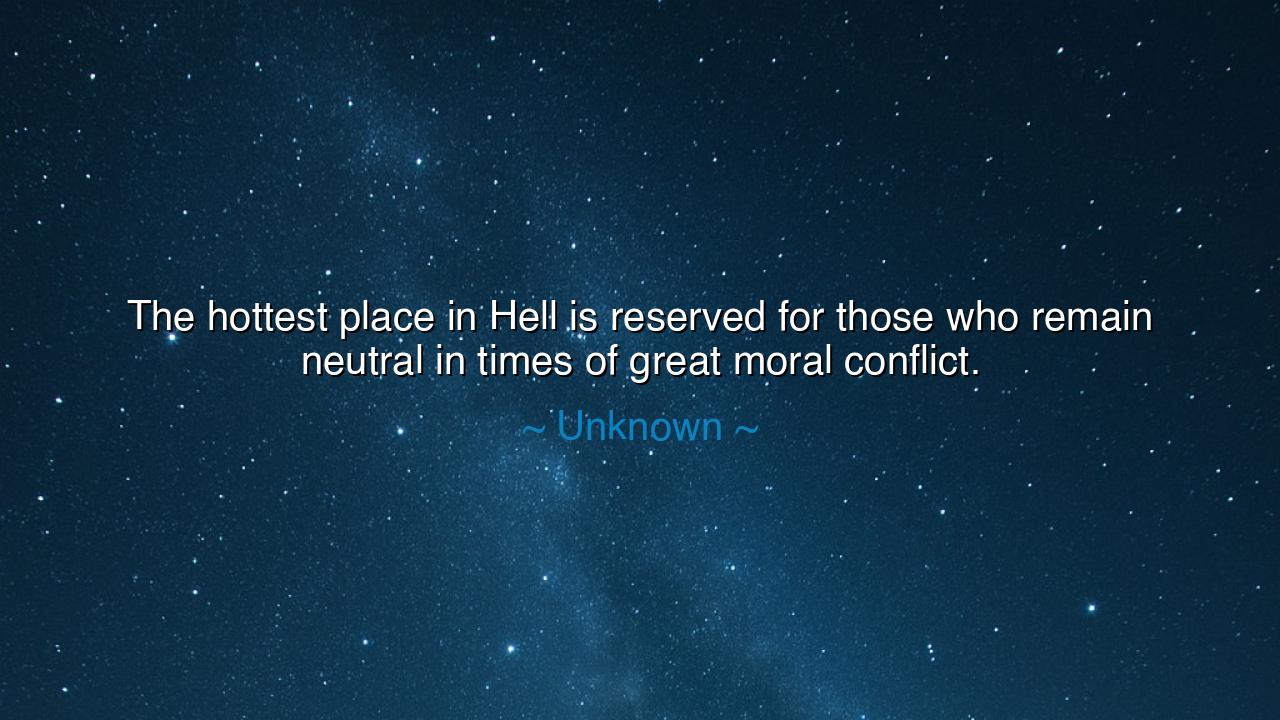
The hottest place in Hell is reserved for those who remain
The hottest place in Hell is reserved for those who remain neutral in times of great moral conflict.






The words “The hottest place in Hell is reserved for those who remain neutral in times of great moral conflict” ring with the thunder of eternal truth. Though often attributed to Dante Alighieri, their precise origin is uncertain — yet their spirit is unmistakably ancient, born from the moral furnace that has tested humankind across the ages. This saying is not a curse, but a warning — a reminder that indifference in the face of evil is itself a form of evil, and that neutrality, when justice demands action, becomes a betrayal of the soul. It teaches that there are moments in history when silence is not safety, but surrender; when to abstain from choosing is to side with the oppressor. The ancients would have called this the sin of cowardice before the divine order of righteousness.
In Dante’s Inferno, the poet describes a realm before the gates of Hell, where the “neutrals” dwell — those who lived without conviction, neither good nor evil, serving only themselves. They are not given the honor even of damnation’s depths; they are condemned to chase a blank banner for eternity, stung by hornets, their blood feeding worms. This image is not about punishment for belief, but for refusal to believe; for never taking a stand. Their crime is not cruelty, but complacency — a coldness of spirit that allowed injustice to flourish. Thus, when we say “the hottest place in Hell,” we speak of the fire of shame that consumes the indifferent — the fire of knowing they had the chance to act, and did not.
Throughout history, neutrality in times of moral conflict has been the refuge of the timid and the ruin of the righteous. When evil rises, it does not require the majority to support it — only for the majority to look away. The tyrants of every age have built their empires not merely upon violence, but upon the silence of those who feared to speak. The Holocaust did not begin with death camps; it began with neighbors turning their faces, officials withholding their objections, and citizens convincing themselves it was “not their concern.” The same spirit of neutrality allows corruption, oppression, and cruelty to seed themselves wherever conscience has grown numb. To remain neutral, then, is not to keep peace — it is to abandon justice.
But there are also the few who stand, who break the silence even when surrounded by fear. Consider Dietrich Bonhoeffer, the German theologian who opposed the Nazi regime at the cost of his life. He could have remained neutral, protected by his intellect and position. Instead, he declared, “Silence in the face of evil is itself evil.” His voice became a light in one of the darkest eras of history. Or think of Martin Luther King Jr., who invoked the same sentiment when he said that history would remember not the words of our enemies, but the silence of our friends. These men understood that morality is not a matter of comfort, but of courage — that to remain silent while others suffer is to become complicit in their pain.
The ancients taught that the measure of a person is not found in their beliefs when times are calm, but in their actions when the storm breaks. Neutrality is the temptation of the weak-hearted, for it wears the mask of reason — “I will not take sides,” says the one who fears the cost of conviction. Yet neutrality in a moral crisis is not reason, but abdication. The warrior who refuses to defend the innocent, the leader who avoids hard choices, the citizen who turns away from injustice — all share the same guilt. For to stand between right and wrong is to give power to wrong. There are no middle paths when the soul itself is on trial.
And yet, this quote is not a call to hatred or vengeance; it is a call to moral awakening. It demands not blind fury, but clarity of heart — the strength to discern truth, to act with compassion, and to bear the weight of conscience. The “hottest place in Hell” is not reserved for those who err in ignorance, but for those who see the fire and feel nothing. The cure for this apathy is empathy — the courage to let another’s suffering pierce your heart. Each person must decide whether to be the one who acts, or the one who watches. For when the generations to come look back upon us, they will not ask whether we were comfortable, but whether we were courageous.
So let this wisdom be passed on to you, O seekers of righteousness: choose a side when justice calls your name. Speak even when your voice trembles. Stand even when your legs shake. Defend the truth, even when it costs you peace. For neutrality may spare you the world’s anger, but it will rob you of your soul’s honor. Remember that every age tests its people with its own moral fire — and the hottest flames are not in Hell, but in the hearts of those who once knew what was right and chose to do nothing. Better to burn for truth than to freeze in indifference.






AAdministratorAdministrator
Welcome, honored guests. Please leave a comment, we will respond soon